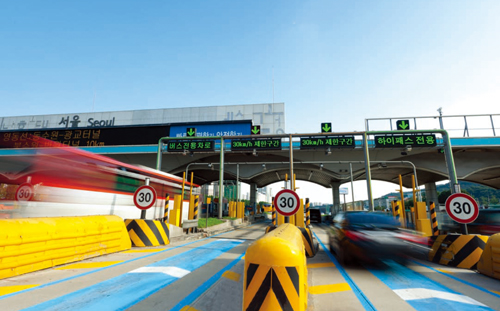The highway company will invite private capital into highway construction projects and reduce expenses in order to cut debt ratio to 91% by 2017

A view of a toll expressway near Seoul built and run by Korea Expressway Corp.
now determined to trim its debts. (Photo:KEC)
Korea Expressway Corp. (KEC) will pursue its plan to cut 6.4 trillion won of its debts by 2017 in an effort to recover the people’s trust by becoming a leader among government-run firms in normalizing their operations through the reductions of debts.
The highway company’s debts stood at around 25.3 trillion won at the end of 2012 and is projected to rise to 36.1 trillion won by 2017, but the company has resolved to hold down the debt increase to 29.7 trillion won without the government’s help by raising toll charges on its highways, the company said.
Around 6.4 trillion won will be reduced from the original debt increase projection to bring down the debt ratio from 97 percent to 91 percent by 2017 in order to build a base for the company’s sound financial health, the KEC said.
The highway company’s debt reduction plan consists of three stages including the reorganization of its business operation, cuts in non-essential expenses, and the sale of its core assets.
In the area of highway construction, the company will cut the investment in new highway construction to around 2.5 trillion won in annual terms depending on the need and the economic concern and, if needed, private capital will be invited to fund the building of highways.
The company will also minimize the repair on old facilities by taking care of only small-scale projects based on safety needs. Some 50 billion won will be cut from the original budget for repair and maintenance of old buildings, among others.
In the area of the sale of core assets, the company plans to sell its stakes in the operating rights of rest facilities along the highways to expand its competitive systems in the existing leasing facilities’ rentals. The company also will divest all of its stakes in the six civilian-invested highways to ensure that its debts are really reduced.
The company will hire an outside expert from the start to make sure that the sales of assets, like the land on which the company’s head office sits and rest facilities management rights, will be made for the right price to preclude any disagreements over prices or the fairness of the deals, the company said.
In the area of cutting expenses, the budget will be used only for the company’s normal operations of its original functions, saving 1.5 trillion won by holding down budget increase factors to below 4 percent from the 7 percent increase projected earlier. The company will also cut normal expenses by 18 percent and other miscellaneous expenses by 30 percent and possibly cut or freeze salaries of officers and staff if needed so that everyone in the company physically feels the company’s intention to make cuts anywhere it can.
The company will try to increase its highway toll earnings through creative marketing ideas, private investments in complex rest facilities, the invitation of solar power generation projects, and other means to boost income.
KEC has seen its debts grow because of its large investments over the past five years to build highways. These investments take as long as 30 years to recoup through the collection of highway toll charges. Tolls account for around 81 percent of total investments, although they account for around 91 percent of the company’s annual income, which is the main reason for the company’s expanding debts.
The company’s debts have been rising due to so many special toll discounts, such as those for regular highway users, light lorries, heavy trucks using highways after midnight, and others that were politically initiated, all reducing the company’s toll fee earnings.
